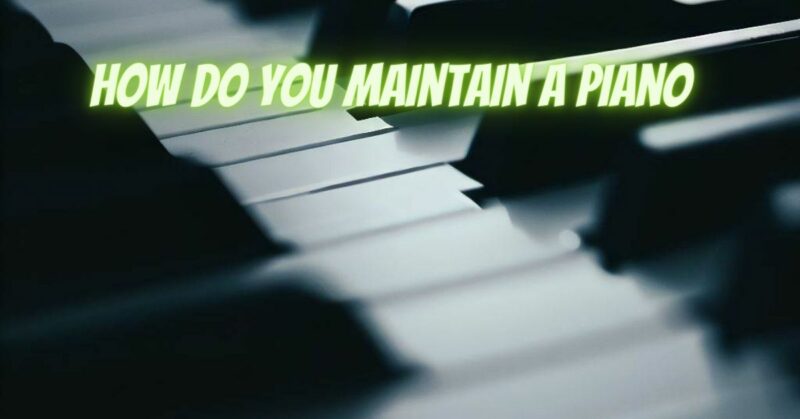A piano is not only a musical instrument but also an investment that requires regular care and maintenance to ensure its longevity and optimal performance. Proper maintenance practices can help preserve the instrument’s tone, playability, and overall condition. In this article, we will explore essential tips for maintaining a piano and keeping it in top shape for years to come.
- Regular Dusting and Cleaning:
Dust accumulation can affect the appearance and functionality of a piano. Regular dusting and cleaning help remove dirt, debris, and fingerprints from the instrument’s surfaces.
a. Use a soft, lint-free cloth to gently wipe the piano’s exterior, including the case, keys, and pedals. Avoid using harsh chemicals or abrasive cleaners that could damage the finish.
b. For the piano keys, you can use a slightly damp cloth or specialized key cleaning wipes. Ensure the keys are dried immediately after cleaning to prevent moisture damage.
- Control Humidity:
Maintaining the appropriate humidity level is crucial for preserving the integrity of a piano’s wooden components. Fluctuations in humidity can cause the wood to expand or contract, leading to tuning instability and potential damage.
a. Ideally, keep the piano in a room with a consistent humidity level between 40% and 50%. Use a hygrometer to monitor the humidity and a humidifier or dehumidifier to make necessary adjustments.
b. Avoid placing the piano near windows, doors, heating or cooling vents, or areas with extreme temperature changes, as these factors can contribute to humidity fluctuations.
- Tuning and Regulation:
Regular tuning is essential to maintain the piano’s proper pitch and ensure a harmonious sound. It is recommended to have a professional piano tuner tune the instrument at least once or twice a year.
a. Find a reputable piano tuner or technician who can accurately tune the piano’s strings and make any necessary adjustments to ensure optimal performance.
b. Additionally, consider having the piano regulated by a professional technician. Regulation involves fine-tuning the mechanical aspects of the piano, such as the key action and pedal response, to ensure consistent touch and responsiveness.
- Protect from Direct Sunlight and Extreme Temperatures:
Direct sunlight can fade the piano’s finish and cause wood damage, while extreme temperatures can affect the instrument’s tuning stability and mechanical components.
a. Place the piano away from direct sunlight or use curtains or blinds to block out excessive sunlight.
b. Avoid exposing the piano to extreme temperature changes, such as placing it near heating or cooling sources.
- Avoid Excessive Moisture and Dryness:
Excessive moisture or dryness can damage the piano’s wooden components and affect its tuning stability. Take precautions to maintain a balanced moisture level.
a. Clean up spills immediately to prevent liquid from seeping into the piano’s mechanisms.
b. Use a piano-specific moisture control system, such as a piano dehumidifier or humidifier, to maintain the appropriate moisture level.
Conclusion:
Proper maintenance is crucial for preserving the beauty, playability, and longevity of a piano. By following regular cleaning practices, controlling humidity levels, scheduling professional tunings and regulation, and protecting the instrument from sunlight and extreme temperatures, you can ensure that your piano remains in optimal condition. Remember, when in doubt or when facing complex issues, consult a qualified piano technician for expert guidance and assistance. With diligent care and maintenance, your piano will continue to bring joy and musical inspiration for years to come.


